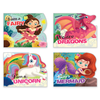Introduction: The Magic of Pretend Play
Remember the days when a cardboard box could become a spaceship, or a bedsheet fort was a magical castle? Pretend play, or imaginative play, is a natural and essential part of early childhood development. It allows children to explore different roles, express emotions, solve problems, and understand the world around them — all while having fun. In today's fast-paced, screen-driven world, encouraging pretend play is more important than ever to spark creativity and build life skills.
Why Pretend Play is Important for Kids
Pretend play isn’t just entertainment — it plays a huge role in cognitive and emotional development. Studies show that children engaged in imaginative play develop stronger problem-solving skills, better language abilities, and greater empathy. Acting out different roles and scenarios helps children make sense of real-life situations and boosts their confidence.
Pretend Play Ideas for Home
Here are some fun ways to encourage your child’s imagination at home:
-
Little Chef: Set up a pretend kitchen with toy utensils or even safe kitchen items. Let kids “cook” using clay or play food.
-
Doctor’s Clinic: Use a toy stethoscope, bandages, and soft toys as patients. This teaches empathy and care.
-
Supermarket Adventure: Turn your living room into a grocery store. Use empty boxes and jars and let kids be shopkeepers and customers.
-
Classroom Setup: Children love playing teacher! Give them a chalkboard or whiteboard and let them teach their toys.
-
Space Explorers: Create a spaceship with chairs and blankets. Add toy planets or stars made from craft materials.
DIY Pretend Play Props
You don’t need expensive toys. Here are simple DIY ideas:
-
Cash Registers: Create one using an old shoebox and paper buttons.
-
Felt Food: Craft colorful food items with felt for endless kitchen fun.
-
Doctor’s Kit: Use empty boxes, cotton, and band-aid stickers to build a basic kit.
-
Puppet Theatre: Make sock puppets and a cardboard stage for storytelling.
Pretend Play Inspired by Storybooks
Storybooks are wonderful tools to inspire pretend play. After reading a story, encourage your child to act out their favorite parts. Books like Aesop’s Fables, animal stories, and fairy tales are perfect for this. Acting out characters helps children improve language skills, express emotions, and build confidence.
Encouraging Independent and Group Play
-
Independent Play: Set up small pretend play corners and let your child explore them alone. It encourages decision-making and creativity.
-
Group Play: Organize playdates where children can role-play together. This builds teamwork and social interaction.
Conclusion: Growing Imaginations Lead to Growing Minds
Pretend play is not just a fun activity — it's a powerful tool for growth. As parents, we can encourage this natural curiosity by providing simple props, reading stories together, and giving children the freedom to create their own magical worlds. So next time your child uses a cushion as a boat or a spoon as a microphone, know that they’re not just playing — they’re learning, growing, and becoming little explorers of the world! For children, they are the captains of mighty ships and the princes and princesses of grand castles. In their minds, they are brave warriors who can conquer enemy troops and save the day. While it may seem adorable and amusing to us, for them, it’s a vivid reality — even if only for a short while. We should never stop them; instead, we should step into their world, encourage their imagination, and be a part of their magical adventures.
📌 Tip: Join your child in their pretend play occasionally. It strengthens your bond and lets you see the wonderful world through their eyes.








